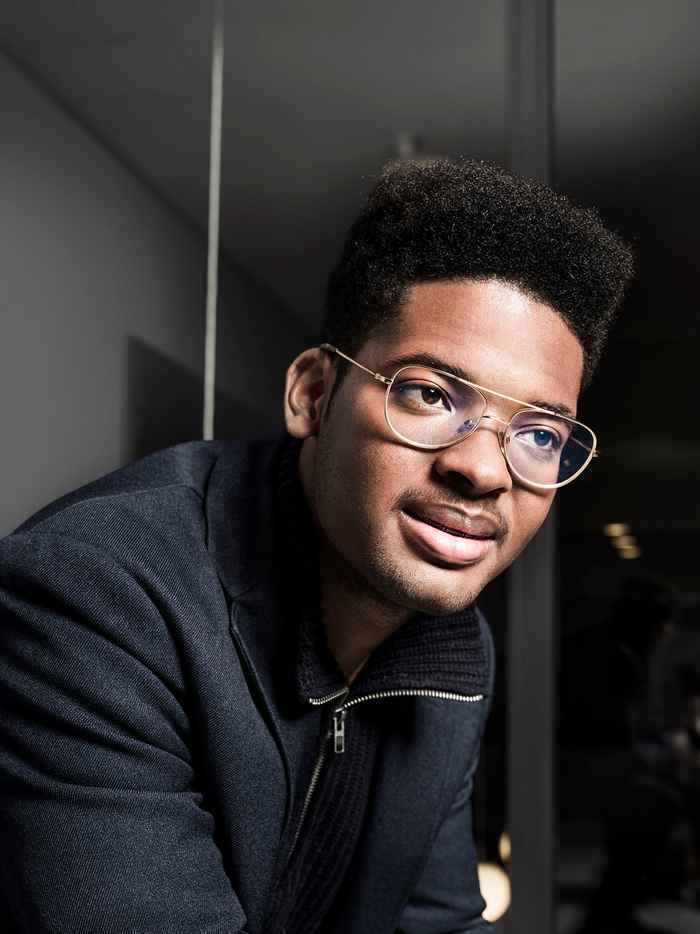Didier Quintius

Who? Didier Quintius (1997)
What? currently working on his Master's in Actuarial Science & Mathematical Finance
First job: admin at a transport company
Favourite spot at the UvA: there's a room with turquoise curtains on the first floor of Building C on the Roeterseiland Campus. It's a peaceful, homey space where Didier likes to sit.
Essential: his laptop
He lived in Suriname until he was 18 and then moved to Amsterdam as part of his long-held plan to become a ‘financial oracle’. Put another way: he enrolled at the UvA and began studying to be an actuary, which meant learning how to calculate complex financial risks. As a part-time job, he is also gaining experience as a business analyst for America Today. He dreams of one day working together with experienced data analysts.
So you just woke up one day and thought, I'm going to study Actuarial Science & Mathematical Science. Is that how it happened?
‘Well, two of my parents’ friends had studied Actuarial Science and I started talking to them about it. What I found really interesting was how many conclusions can be drawn from data, which predictions you can then make and how crucial these are. I wanted to learn how to do that, too! My parents in Suriname were always really involved in my choice of studies, too. We spent hours talking not only about which courses I like best, but also about which careers would be the best fit if, one day, I decide to come back to Suriname and help further the country's development. When I enrolled at the UvA, that also meant moving to the Netherlands on my own. From when I was little, the obvious plan was that I'd go off to university in the Netherlands someday. My parents wanted me to have the best possible education. And here I am.’
You have to be good with numbers and really enjoy sinking your teeth into complex issues.
Your programme sounds really cool. But what can you do with this degree?
‘I do spend a lot of time explaining to other people what this programme's about. In simple terms, it teaches you to be an actuary who calculates complex financial risks. That means questions like whether smokers should pay more for health insurance, or how many claims an insurance company can expect to see in the year ahead – and based on that number, how high they should set their premium. In order to predict these things, you have to simultaneously take a wide range of societal trends into account, everything from the ageing population to inflation. So you have to be good with numbers and really enjoy sinking your teeth into complex issues. This degree can take you in a lot of different directions. Actuaries can work for consultancy firms, for financial institutions such as insurance companies and pension funds, or for the government. They provide insight, advice and solutions for all kinds of financial risks. Personally, I'm eager to learn how data analysis can be applied outside the world of finance. Data analysts are needed in more fields than just the financial sector. Maybe I'll pursue a second Master's to improve my programming skills. All the developments taking place with regard to Big Data will only serve to increase worldwide demand for actuaries in the coming years. I'm young, so there's still plenty of time to pick a direction.’
You become a kind of financial oracle, but with the data to back it up.
Have you encountered any other challenges during your studies?
‘This degree programme requires a great deal of self-discipline, because it has relatively few teaching hours compared to other programmes. So if you want to pass your exams, you have to really dive into the material on your own in order to understand it. In the second year of the programme, I noticed that my motivation was suffering because I didn't see enough connection to real-world practice; it was too theoretical for me. And so I attended a conference on the current issues that actuaries are facing today. I need that sort of thing, to be reminded of why I'm pursuing this degree in the first place. I also found an added connection to practice in my part-time job as a business analyst for the clothing company America Today. As a way to gain more practical experience, I started testing out analyses. It turned out to be more difficult than expected, but it's teaching me a great deal. For my next job, I'm going to look for a place where I can work with experienced data analysts in a team setting.’
Is there anything else about the UvA you like in particular?
‘For me, one thing that characterises UvA students is that they often have a whole other world going on outside their lives at the university. When I meet students from other cities or other universities, it sometimes feels like all their activities take place in their home city and involve one specific group of friends. They have either a society of some kind or their classmates, and that's who they hang out with. In Amsterdam, people seem to be much freer about such things. Many of my friends don't have roommates; they live alone. Each of them belongs to a bunch of different “cliques”, everything from work friends to out-of-town groups. I find that diversity really appealing. What's more, this programme has really shifted my perspective: I realise now, more than ever, how many possibilities I have in life. Everywhere I look, I see that hard work makes all things possible.'